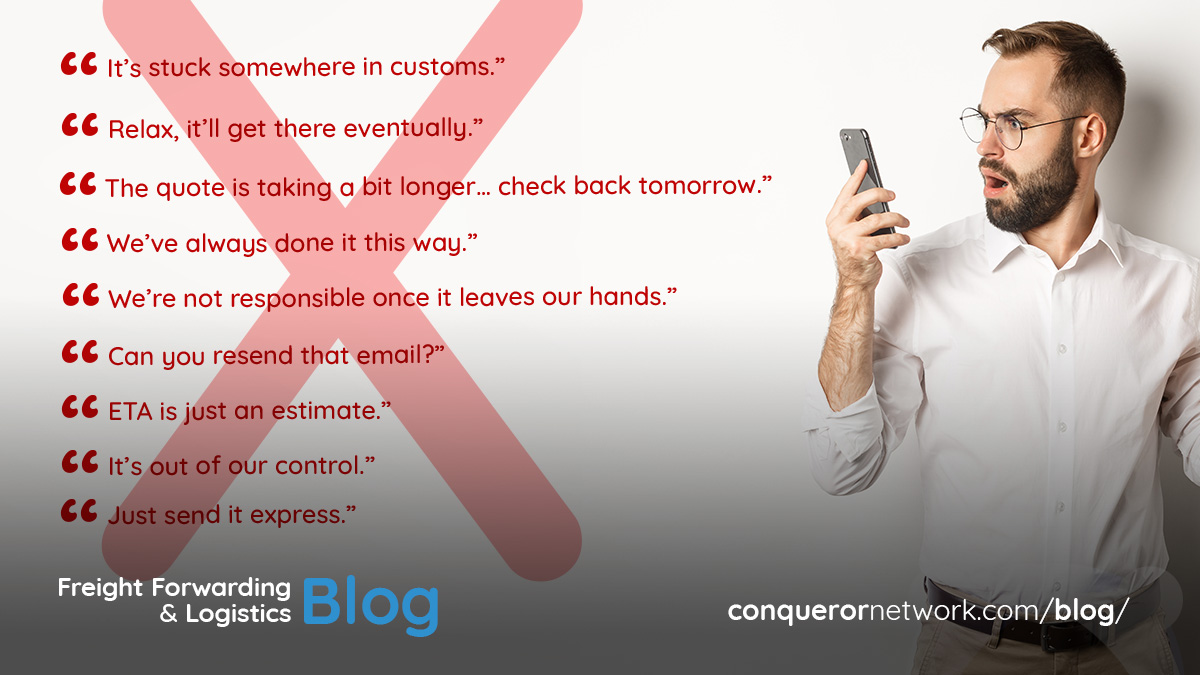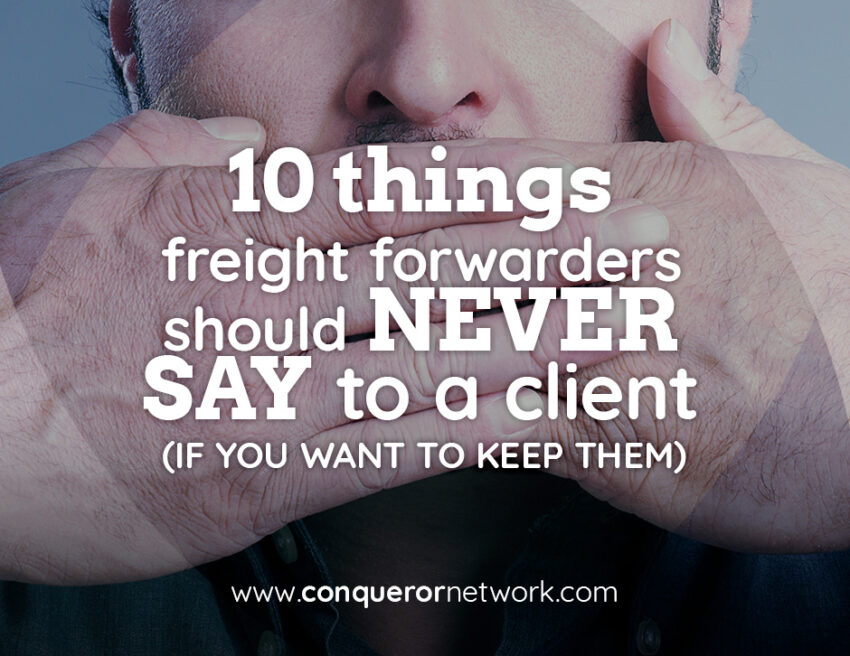Let’s be honest. You probably didn’t get into freight forwarding for the small talk. You got in because you know how to move cargo from point A to B, handle complex logistics, and keep operations running even when the world feels upside down. But here’s the thing: being great at freight doesn’t always mean you’re great at managing clients.
And in a business where trust is currency, a few careless words can cost you more than just one shipment; they can cost you the client entirely.
So ask yourself:
- Have you ever tried to explain a delay and ended up sounding like you were just making excuses?
- Have you lost business because your quote took too long to send?
- Do you sometimes rely on “we’ve always done it this way” when clients push for digital solutions?
If you’re nodding even slightly, it might be time to reassess how you talk to the people who pay you.
Here are 10 things you should never say to a client and what to do instead.
1. “It’s stuck somewhere in customs.”
This one screams: I have no clue where your cargo is. In an industry where clients are constantly under pressure to meet tight delivery windows, vague updates erode trust quickly. Clients expect transparency, and if you can’t provide real-time updates, they’ll look for a forwarder who can.
What to do instead:
Be specific and proactive. If there’s a delay, explain why and give a new estimated delivery time. If the cargo’s in transit, tell the client exactly where it is and when it’s expected to arrive. Use tracking tools that let you give clear, real-time updates and don’t wait for clients to ask. The more visibility you offer, the more confidence they’ll have in your service. Today’s shippers don’t just want goods delivered; they want to feel in control every step of the way.

2. “The quote is taking a bit longer… check back tomorrow.”
This tells the client that their request is at the bottom of your to-do list. In a fast-paced environment, delayed quotes are deal breakers. Clients expect speed and accuracy. If you’re still buried in Excel spreadsheets, you’re already behind.
What to do instead:
Speed matters, but so does accuracy. Clients won’t wait around for a quote that takes days or one that comes back incomplete. The best approach is to streamline and digitize your quoting process. Use tools that let you store rates, calculate costs instantly, and send professional quotes within minutes—not hours. If you’re still relying on manual spreadsheets and back-and-forth emails, you’re creating friction where there should be flow. Automating this step doesn’t just save time, it shows clients you value theirs. A fast, reliable quote often makes the difference between winning the job and losing it.
Conqueror’s FreightViewer allows you to upload rates and generate instant quotes, making you faster, more efficient, and far more attractive to time-sensitive clients.
3. “Relax, it’ll get there eventually.”
Telling a stressed client to relax is like throwing gasoline on a fire. Even if you’re confident about the shipment, dismissing their concern damages the relationship.
What to say instead:
Acknowledge the pressure they’re under and show them you’re on it. Clients want to feel heard and supported, not brushed off. A better response would be something like, “I completely understand how important this shipment is for you. We’re tracking it closely and will send you real-time updates as it moves through each stage. If anything changes, you’ll hear it from us first.” This approach shows empathy, professionalism, and control. It shifts the tone from dismissive to dependable, which builds trust, especially when tensions are high. Even if you can’t solve the issue immediately, clear communication goes a long way.
4. “We’ve always done it this way.”
This isn’t a reason, it’s a red flag. In a global logistics landscape that’s moving faster than ever, standing still is the same as falling behind. When clients hear this, what they really hear is: We’re not interested in improving. We’re not adaptable. We’re not keeping up.
Today’s shippers expect forwarders to be agile, data-driven, and transparent. If you’re still relying on phone calls, manual spreadsheets, and outdated systems, you’re not just slowing yourself down—you’re pushing clients straight into the arms of competitors who offer faster, smarter solutions.
Smart move:
You don’t have to figure everything out alone. Being part of a modern logistics network like Conqueror gives you access to shared digital tools, process improvements, and support from experienced professionals who are facing the same challenges. You learn what’s working, what’s not, and how to adapt without wasting time reinventing the wheel. It’s not just about adopting new technology, it’s about building a future-ready business that clients want to work with.
5. “We’re not responsible once it leaves our hands.”
Technically, you might be right. But saying this out loud or even implying it sends the wrong message. It tells your client that when things go sideways, you’re stepping back instead of stepping up. In logistics, delays and disruptions are inevitable. What sets a great forwarder apart is how they respond when those disruptions hit. Clients don’t care whose “fault” it is. They care about outcomes, communication, and feeling like someone is in control. If they booked the shipment through you, then you’re their point of trust. Passing the buck makes them feel abandoned at the worst possible moment.
Better approach:
Take ownership of the issue, even when a third party is involved. Say something like, “The delay stems from the airline, but we’re already in contact with them and working to get a clear update. I’ll keep you informed as soon as we have more movement.” Then follow through. Keep them in the loop. Translate airline or carrier jargon into plain language. Let them know you’re not just watching the situation, you’re actively managing it.
This kind of leadership builds serious loyalty. Clients remember the forwarders who stayed calm, took responsibility, and made the chaos feel manageable. That’s how you turn a disrupted shipment into a long-term relationship.
6. “Can you resend that email?”
Asking this once in a blue moon is fine. But if you’re doing it regularly, it signals a bigger problem—and your client sees it. What they hear is: You didn’t bother to track our communication, and now you’re making us do it for you. It’s frustrating, and it chips away at your credibility. In logistics, clients expect precision. If you can’t find a critical email or attachment, how can they trust you to manage their shipment?
Pro tip:
Build structure into your daily workflow. Use organized folders, naming conventions, and email tagging systems so nothing slips through the cracks. Don’t rely on memory. Rely on systems. Freight forwarders in global networks like Conqueror often sharpen their internal operations by learning from partners in other countries. You pick up smarter habits, better tools, and streamlined ways of working because you’re constantly surrounded by professionals who run tight ships themselves. At the end of the day, your client shouldn’t have to resend anything. You should already have it.
7. “ETA is just an estimate.”
Yes, it’s technically accurate but saying this out loud sounds like you’re shrugging off responsibility. To a client with a deadline, that kind of language feels careless. It suggests you’re not fully engaged or don’t understand what’s at stake. In freight forwarding, time is money. Clients aren’t asking for guarantees, they’re asking for attention. They want to know that you are watching the clock, even if delays are out of your hands.
Better approach:
Be clear, but also show commitment. Say something like: “Right now, the ETA is 5 hours. We’re tracking the shipment in real time, and I’ll let you know immediately if that changes. If there’s any sign of delay, we’ll take action and propose alternatives.”
This tells the client two things:
-
You’re not hiding behind vague terminology.
-
You’re actively managing their shipment instead of just reacting when something goes wrong.
That’s the difference between being a vendor and being a trusted logistics partner.
8. “It’s out of our control.”
This might be true, but saying it flat out makes you sound powerless and disengaged. And in logistics, that’s the last impression you want to give. Clients aren’t paying you to step back when things get complicated. They’re paying you to lean in, manage risk, and keep things moving, even when obstacles come from third parties.
When you say, “It’s out of our control,” what the client hears is: “You’re on your own.” That erodes trust fast, especially during critical shipments or high-stakes deadlines.
What to say instead:
Acknowledge the situation and show you’re taking ownership: “This part of the process is handled by a third party, but we’re actively coordinating with our partner on the ground to get it sorted. I’ll keep you in the loop and update you as soon as we have any movement.”
9. “Just send it express.”
So what’s the bigger picture?
Every freight forwarder has dealt with tough clients, unexpected delays, and chaotic port operations. But how you handle communication especially under pressure can be the difference between a one-time shipment and a long-term partnership. The best forwarders combine logistical expertise with customer communication skills. And that combination builds trust.
Why it pays to be part of a network
Going it alone is tough. Freight forwarding is competitive, and clients expect more than ever.
That’s why hundreds of independent freight forwarders have joined Conqueror Freight Network. Members get:
- Exclusive territory coverage
- Access to FreightViewer and other digital tools
- A trusted circle of vetted partners
- Annual meetings that convert relationships into real business
Being part of a network doesn’t just boost your reach; it improves how you work, how you quote, and how you communicate. Ready to stop winging it and start scaling it?


